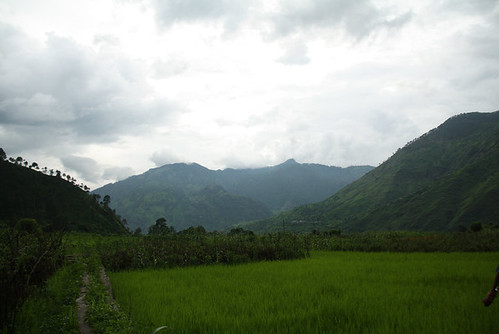
A blog post by WEA's India Director, Rucha Chitnis
“Mahila hi kisaan hai! Wohi bharat ki shaan hai,” chant a group of rural women assembled at a meeting in the village of Janakpur, in the state of Uttar Pradesh. This slogan is a rallying cry by rural women, who are proclaiming, “Yes, women are farmers! They are the pride of India!”
I am here visiting Gorakhpur Environmental Action Group (GEAG), a respected grassroots organization that advocates for the rights of small and landless women farmers. GEAG is guided by sound gender and ecological principles, where sustainable agriculture and natural resource management practices are key program priorities.
For generations, women farmers across India have struggled for their rights and identity. The deeply entrenched patriarchal norms deny women their basic rights as farmers, which include land rights, access to agricultural extension services, control over productive resources and assets, and decision-making over family income and expenditures. This is ironic given that women produce over 50% of the food in India and over 85% of rural women are engaged in agriculture. This pervasive and systemic gender discrimination often starts within the confines of their homes to the farms and finally in the laws and policies of the government, where farmers are regarded mostly as male. Such inequalities have also rendered the agricultural labor of rural women largely invisible and unaccounted for.
And yet, as we drive across the national highways of India from the desert state of Rajasthan to the flood-affected parts of Uttar Pradesh, we see rows of women bent over fields sowing, weeding, harvesting and caring for the livestock. We see girls carrying a heavy load of fodder and fuel wood, and we see women selling their produce in local markets. Women farmers make valuable contributions towards their household food and economic security, as well as conserving the biological diversity of crops by saving indigenous seeds, growing food and managing the water and energy needs of their homes.
During our meetings with women farmers, they shared grave concerns about water resources for irrigation and personal consumption. Given that most small farmers (majority of whom are women) depend on rain-fed irrigation, the changing patterns of monsoons have a devastating impact on their livelihoods. Women also expressed a need for capacity-building and training support to learn about improving their food security, appropriate technologies and reviving traditional farming practices that are eroded in the face of industrial agriculture.
During our meetings with women farmers, they shared grave concerns about water resources for irrigation and personal consumption. Given that most small farmers (majority of whom are women) depend on rain-fed irrigation, the changing patterns of monsoons have a devastating impact on their livelihoods. Women also expressed a need for capacity-building and training support to learn about improving their food security, appropriate technologies and reviving traditional farming practices that are eroded in the face of industrial agriculture.
During a meeting with landless farmers in Eastern Uttar Pradesh, women shared how they are farming ecologically by making natural pesticides and fertilizers from their farm inputs. These women were also saving their indigenous seeds, which they recognized as an important step towards self-reliance by reducing their dependency on external, expensive seeds from the market. I also met an inspiring group of women, who were master trainers; they traveled to different villages training women on ecological farming practices and exchanged their indigenous seeds with others. They are, also deeply committed to claiming their identity and entitlements as farmers. As one woman said: "I feel awakened. I know now that I have rights as a woman and as a farmer. We are all a part of this struggle to fight for our livelihoods and dignity."
WEA's India Program partners with Indian grassroots groups who are holistically building the capacities of women farmers and grassroots women leaders to improve their food and economic security, preserve the environment and traditional knowledge, and build political will.





No comments:
Post a Comment